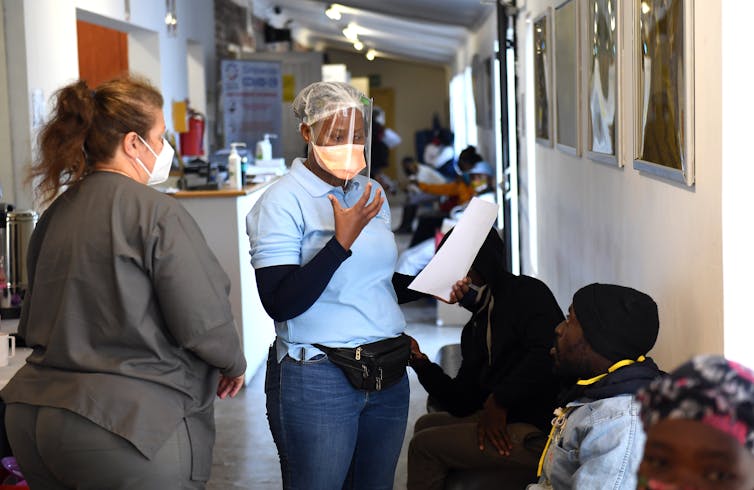- home Home
- keyboard_arrow_right Uncategorized
- keyboard_arrow_right Posts
- keyboard_arrow_rightCOVID-19 vaccine trial in South Africa: everything you need to know
COVID-19 vaccine trial in South Africa: everything you need to know
By: Shabir Madhi, University of the Witwatersrand

Felix Dlangamandla/Beeld/Gallo Images via Getty Images
There isn’t enough clinical research being done in Africa. Less than 2.5% of all clinical trials in the world are done on the continent. This is why South Africa’s involvement in one of the COVID-19 vaccine trials is so important. The country’s effort is being led by Professor Shabir Madhi. The Conversation Africa’s health and medicine editor Ina Skosana spoke to him about the process, and what can be expected. This is an edited version of a podcast, which you can listen to here.
How does the trial work?
The study that we embarked on in South Africa is for a vaccine that was developed by the Jenner Institute at the University of Oxford. It’s what is known as a non-replicating vector base COVID-19 vaccine.
The study came about when I reached out to the principal investigator at the University of Oxford whom I’ve known for over 20 years to find out if there was any interest on their part to include South Africa as part of the clinical development plan of the vaccine. The short answer was yes, provided we conducted the study on our own, including raising the funding to conduct the study.
The agreement with Oxford University preceded a subsequent agreement that they’ve entered into with AstraZeneca, the pharmaceutical company responsible for the further clinical development of the vaccine and future manufacturing. Pre-clinical studies of this vaccine candidate, including in non-human primates, have demonstrated initial evidence of the safety of this vaccine, as well as its ability to protect against COVID-19 disease.
Why South Africa?
The main reason is that the legacy of vaccines shows that they don’t necessarily work similarly across different populations. So if we want to be one of the early adopters, in terms of implementing vaccination against COVID-19 as part of our immunisation programme, we really need to generate data applicable to the local context.
Read more:
Africa must make sure it’s part of the search for a coronavirus vaccine
A number of past vaccines have been shown to be highly efficacious in high income settings. But when they’ve gone on to be evaluated in low and middle income settings, they were found to be much less efficacious and, at times, not efficacious at all.
So if we want to make informed decisions at an early stage about whether these vaccines are going to be of benefit to people in South Africa, it’s critical that we undertake the clinical evaluation during the start of the entire programme, rather than at the latter stage. Waiting for results to come in from other studies would just lead to a lag in terms of the timing when vaccines would be introduced in South Africa as well as other low and middle income countries.
Read more:
Africa waited for solutions to past health crises: will it be different for COVID-19?
This has been the experience for many other life saving vaccines where it has taken between five and 20 years between their availability in high income countries and low middle income countries.
How are participants chosen for the trial?
Participation is completely voluntary.
Participants typically come to inquire about the study at clinics. We sit down with them and explain what the study is all about. What are the criteria for joining, what the expectations are of the volunteers because the study has quite intense expectations in terms of being able to come for regular visits. And they obviously need to be agreeable that when they do participate in the study, if they do develop signs and symptoms suggestive of COVID-19, that they would come forward to be investigated. This is critical for us to be able to determine whether this vaccine protects against COVID-19.
In addition, we would do some blood tests which ensures that they don’t have any sort of medical conditions that we would want to exclude.
If they’re found to be eligible, we randomly allocate them to one of two groups. Half will receive the vaccine, and the other half a control substance, which in our case, is a placebo. This is important for two reasons. The first is that it allows us to provide robust data in terms of the safety profile of the vaccine. And the control group enables us to determine whether the vaccine actually does have any impact in protecting against COVID-19.
Is there any reason people should be sceptical of the trial?
The short answer is no. The narratives that Africans are being used as guinea pigs is fundamentally incorrect. Rather a case of us wanting to generate robust scientific data to be able to make informed decisions about whether those vaccines actually do protect South Africans – and possibly Africans more generally – against developing COVID-19.
What are the next steps?
Right now we busy enrolling into the clinical trial. We’ve just reached the 200 mark out of the 2000 participants that we plan to enrol. We expect to have completed enrollment of all the volunteers over the next three to four weeks.
After that we will keep in touch with all of the participants at least every two weeks, including weekly SMS messages to determine whether or not experiencing any signs or symptoms of COVID-19. And if they are they will be asked to come in to be investigated to determine whether they are infected or not.
The endgame of the study is twofold. One is obviously to evaluate the safety of the vaccine, which is something that is ongoing almost on a daily basis.
The second part is that once we have about 42 individuals that have developed COVID-19 at least about a month after they’ve received the first dose of either the vaccine or the placebo we will then be able to do an analysis to determine whether the vaccine actually does protect against COVID-19. Specifically we will be testing if the vaccine efficacy is at least 60%; that is by being vaccinated your risk for developing COVID-19 will be reduced by at least 60% if not more.
Read more:
COVID-19 vaccine: the challenges of running a trial in the middle of a pandemic
We anticipate that we will probably be able to provide an answer as to whether this vaccine works and protects against COVID-19 by the end of November this year. In the worst case scenario it might take us a bit longer probably into the second quarter of next year.
What about managing expectations?
It’s very exciting to be involved in the sort of clinical development of the vaccine. But we need to be guarded in terms of our expectations as to what the result will be.
The fact that we’re embarking on a clinical trial doesn’t mean that we’re going to have a vaccine that’s going to protect against COVID-19.
Only about 10% of vaccines that go into clinical trials are eventually licensed for use. Right now there’ are approximately 200 vaccines that are being developed for COVID-19. It would be a huge accomplishment if, over the next 12 to 18 months, we are successful showing that even one out of every 20 (5%) of the vaccines that go into human studies are safe and provide some protection against COVID-19.
So even though there’s a huge amount of work taking place around vaccines, at least for the next 12 months the only tools that we’ve got available to us to try to protect people is adherence to physical distancing, the wearing of face masks in public spaces, avoiding mass gatherings, and making sure that you’re in adequately ventilated settings when in public spaces.
Anyone living in South Africa who is interested in participating in the study can e-mail [email protected] for more information.![]()
Shabir Madhi, Professor of Vaccinology and Director of the MRC Respiratory and Meningeal Pathogens Research Unit, University of the Witwatersrand
This article is republished from The Conversation under a Creative Commons license. Read the original article.
Written by: Natasha
Similar posts
MORE ARTICLES

SA Powerball Results for tonight: Tuesday, 01July 2025

Zenande Mfenyana captures viewers’ hearts as Thumeka on ‘Inimba’

WATCH: Scorpion Kings begin preparations to ‘Fill Up’ Loftus Stadium

The best of Point of View: DA dares Ramaphosa, Nairobi protests turn deadly and Chrispin Phiri in the spotlight

New month brings new electricity bills for City Power customers
QUICK LINKS
UpComing Shows

The Best T in the City
With T Bose
He has held it down in the world of mid-morning radio with the best music, riveting topics, brilliant mixes and interesting guests. Every weekday, The Best T proves why he is the BEST by connecting to you like only your bro or favourite uncle could. He lets his listeners dictate the songs they want to hear in the ever-popular Top 10 at 10, and his Three Teaspoons never run out. Catch The Best T in the City Mondays to Fridays from 09h00 to 12h00.
close
Feel Good
With Andy Maqondwana
Feel good about feeling good! That's exactly what The Feel-Good show is about. An escape from the negativity that surrounds us, indulging you in good feels. Pass it on to one and all. Spread the good feeling around Gauteng with Andy Maqondwana.
close
Kaya Biz
With Gugulethu Mfuphi
The world of business is simplified for you by Kaya Biz with Gugulethu Mfuphi. This fast-paced award-winning business show talks to the corporate giants as well as up and coming entrepreneurs about their wins and challenges. Gugulethu invites guests to offer their analyses of markets and economies, and also delves into issues of personal financial wellness. Kaya Biz airs Mondays to Thursdays 18h00 to 19h00.
close
Point of View
With Phemelo Motene
Point of View with Phemelo Motene delves into the day’s current affairs, touches on real issues that affect people’s daily lives and shares expert advice on questions posed by the audience. Mondays to Thursdays 20:00 to 22:00.
closeConnect with Kaya 959
DownLoad Our Mobile App
© 2025 Kaya 959 | On The Street On The Air











